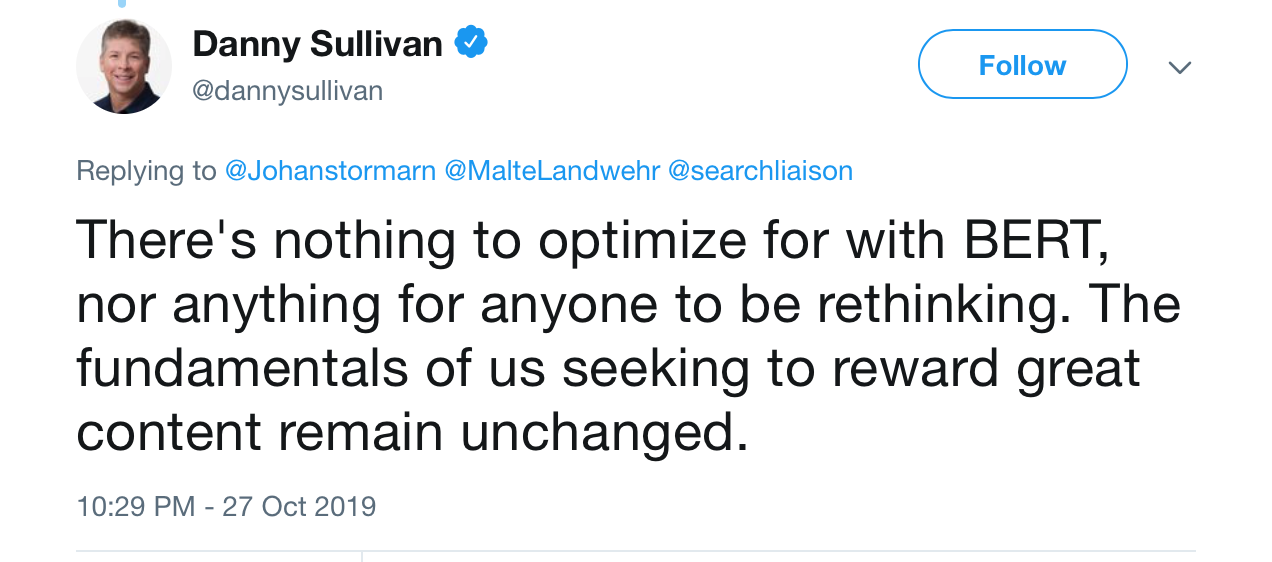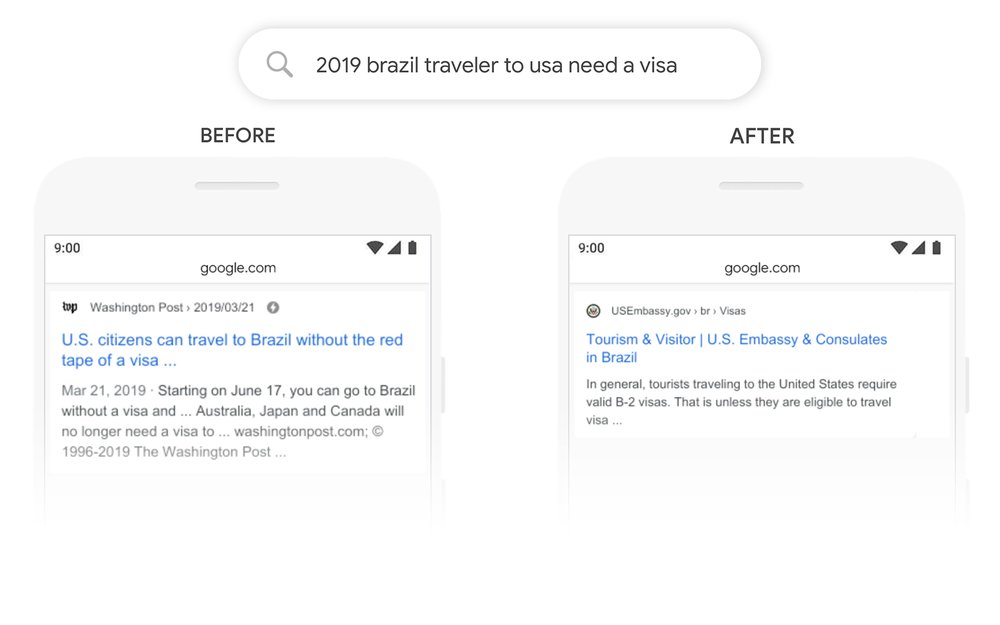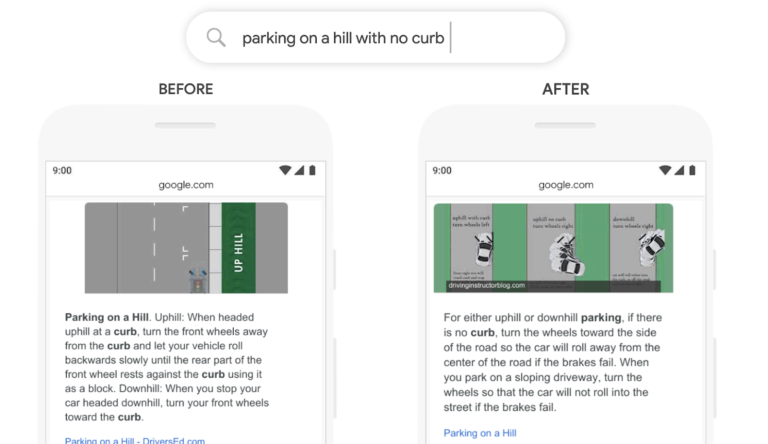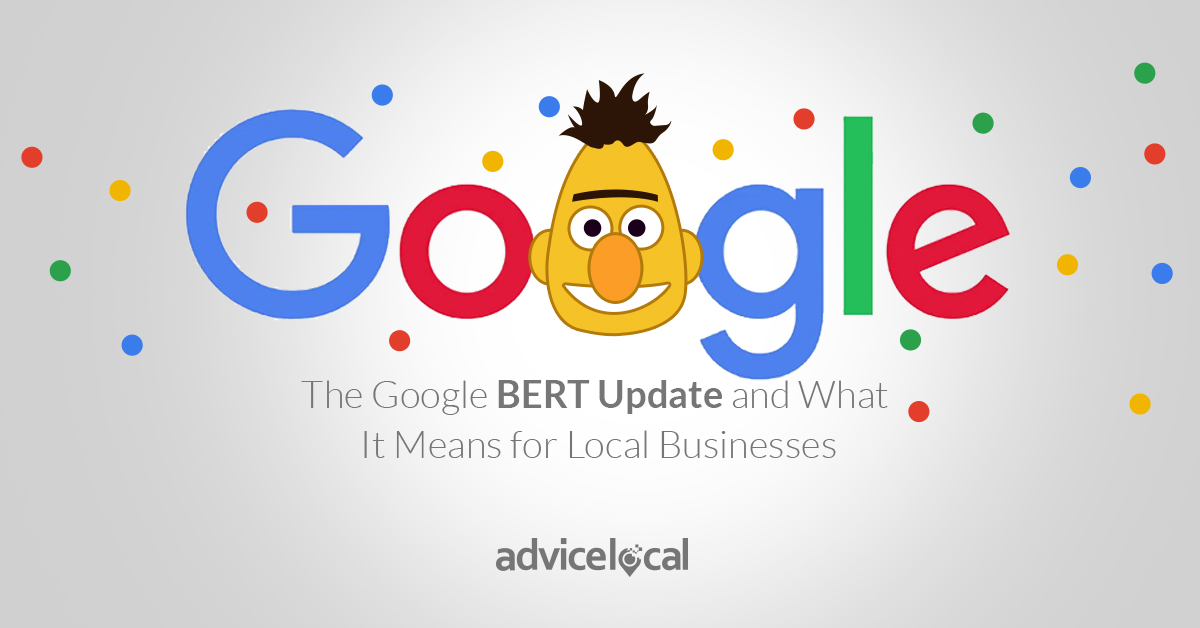Warning: Undefined variable $handle_code in /mnt/wp/advicelocal/public_html/wp-content/plugins/click-to-tweet-by-todaymade/tm-click-to-tweet.php on line 243
Warning: Undefined variable $handle_code in /mnt/wp/advicelocal/public_html/wp-content/plugins/click-to-tweet-by-todaymade/tm-click-to-tweet.php on line 243
By now, I’m sure you’ve probably heard about the BERT update to Google Search and maybe even wondered where Ernie is. Well, today I’m not talking about Sesame Street, but instead about how local businesses can benefit from the BERT update.
To paraphrase Google, BERT is the biggest leap forward in the past five years and is one of the biggest leaps forward in the history of Search.
While on the surface another Google update may seem daunting, the fact is BERT can either help a business or hurt it. Let’s dig into BERT and how you can help the local businesses you represent grow.
What Is the BERT Update?
BERT (Bidirectional Encoder Representations from Transformers) is a deep natural language learning algorithm. It uses ‘transformers,’ mathematical models which allow Google to understand words in relation to other words around it, rather than understanding each word individually.
These new models will help Google understand not only the main keywords in a search query but also the nuances of the search. This means that SERPs will show sites more in-line with the searcher’s intent.
To simplify it, BERT can understand search queries better and deliver more accurate search results. It can consider the context around the primary keywords and deliver even better search results based on the searcher’s intent.
We’ll talk more about what this means for your clients’ sites below and how you can help your clients capitalize on the BERT update.
How Will BERT Affect Site Rankings and Traffic?
Since Google says “when it comes to ranking results, BERT will help Search better understand one in 10 searches,” you may think that means it’ll affect site rankings a lot, but in reality you may not notice any major changes.
So, what types of searches is BERT affecting?
This is how Google described the changes: “Particularly for longer, more conversational queries, … Search will be able to understand the context of the words in your query.”
If most of your client’s website traffic comes from long-tail keyword searches, you may see a significant fluctuation in traffic. If most of your client’s traffic comes from simple primary and secondary keyword queries, the effect on their traffic isn’t going to be as noticeable. We’ll talk more about long-tail keywords below.
How to Optimize for BERT?
The only way to optimize for the BERT update is to follow what Google has been saying all along: write for the user. With the advances to Google search likely to continue trending in this direction, content creators need to be thinking not about how to optimize for Google, but how to optimize for the user.

As Danny Sullivan, Google’s public Search liaison, said on Twitter, there’s nothing to optimize for with BERT.
Produce quality content that gives the user what they are searching for, and BERT will play to your advantage. Poorly written or unfocused content probably won’t make the cut. What you should do is continue to target long-tail keywords and shoot for featured snippets.
How BERT Affects Long-Tail Keyword Searches
First, what are long-tail keywords?
In a nutshell, long-tail keywords are longer, more conversational phrases, usually in the form of a question. While this may not be how most do typed searches, it’s how the vast majority of voice searches are completed. For example, someone might ask Siri or type into Google, “How do I unclog a toilet” or “where’s the nearest auto shop.” These are both examples of long-tail keywords.
As Google said, the power of BERT is being able to better understand searches that have context words. For example, Google can now better understand the relationship that prepositions like “for” and “to” have with their surrounding keywords.
Here is a sample Google provided of a long-tail search where the search results have been improved due to BERT:

Image courtesy of Google.
Before BERT, Google Search didn’t really understand the context of the query. The result included the keywords from the query, but the result didn’t match the intent of their search.
But as you can see, with BERT, the new search result was much more relevant for someone searching for information about travelling from Brazil to the United States.
The best thing about long-tail keywords is that they tell you the user intent. You know exactly what the searcher wants, and so you can build really specific content around that intent for your clients.
We’ve written before about the importance of optimizing for long-tail keywords and voice search. If you haven’t read our how-to, you should!
How BERT Affects Featured Snippets
The BERT update is affecting featured snippets along with rankings, Google announced, making them even more relevant to the intent of the searcher. This means that many featured snippets from long-tail queries likely saw a change when the update went live, which had to be a big win for some and a loss for others.
Here is an example Google provided of how BERT is affecting featured snippets:

Image courtesy of Google.
The previous featured snippet for “parking on a hill with no curb” included the keywords from the query, but it didn’t accurately reflect the searcher’s intent. Google couldn’t understand the relationship of the keyword “curb” with the key phrase “parking on a hill.” Now, after the BERT update, the featured snippet has changed since Google can now understand the context of the word “curb” in the query.
So, what can you do to earn one of these featured snippets?
Today, it’s all about FAQs. You can use Google and other SEO tools to see what common queries people are searching, and then you can produce optimal content that directly answers that question. For more on how to earn a featured snippet, see our blog post on voice search and featured snippets.
Win With BERT and Win in Search
Now that you know you can make BERT happy and how to do it, it’s time to get busy optimizing your client’s websites for the long-tail and the long-haul.
While BERT is making Google Search smarter, we’re behind the scenes making listing management smarter (and better!). Request a demo to find out if the Advice Local team can help you to better help your local business customers get found online.




